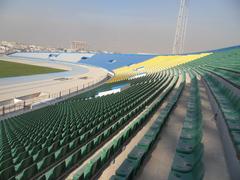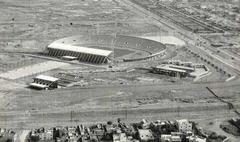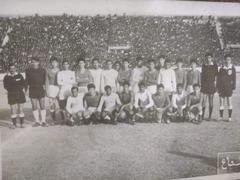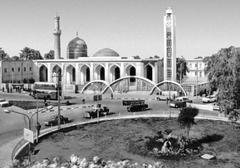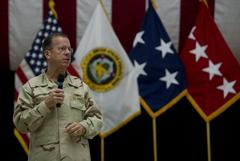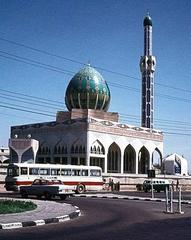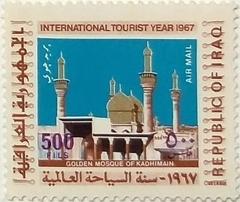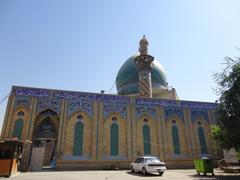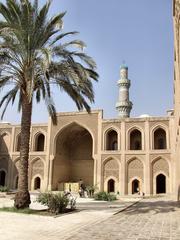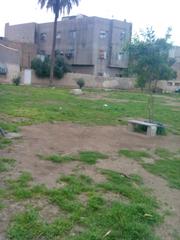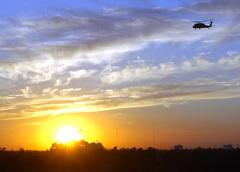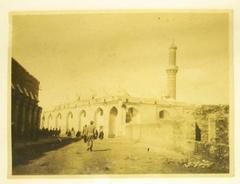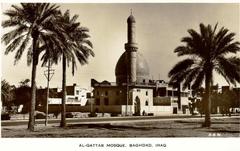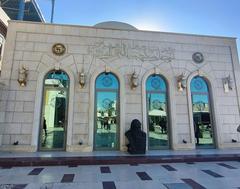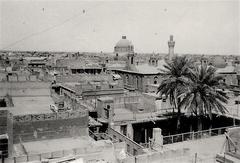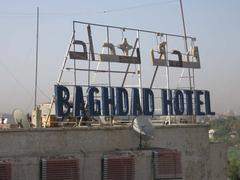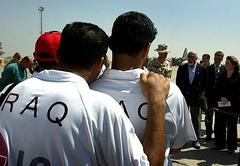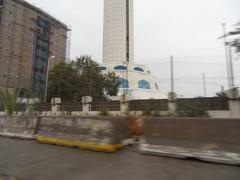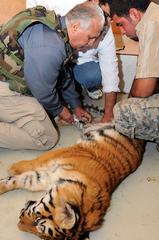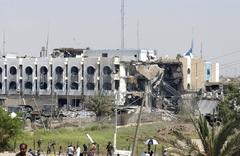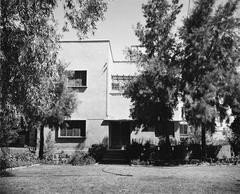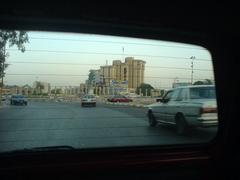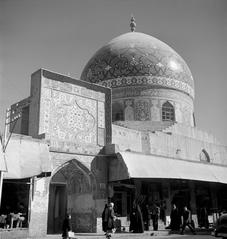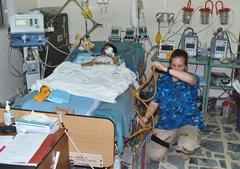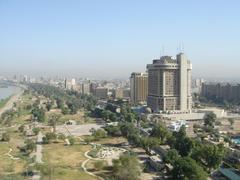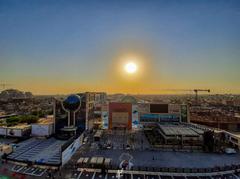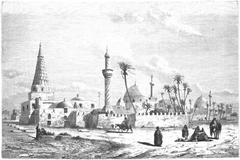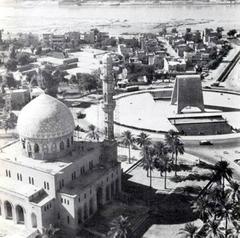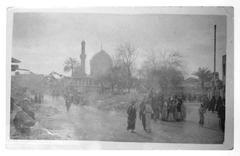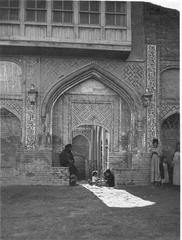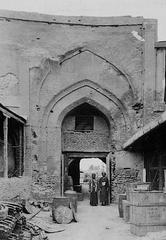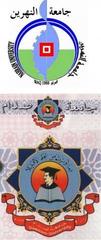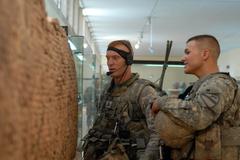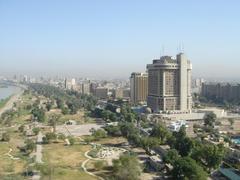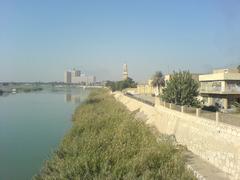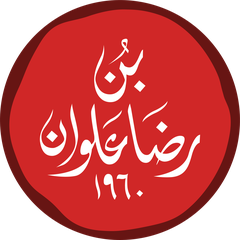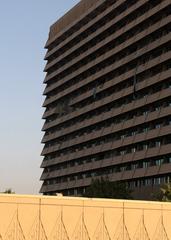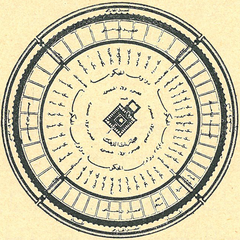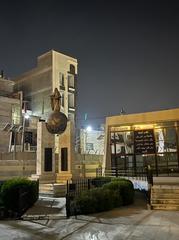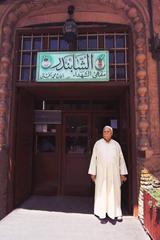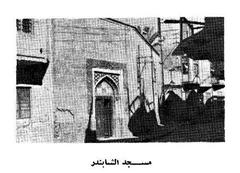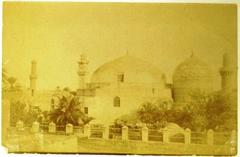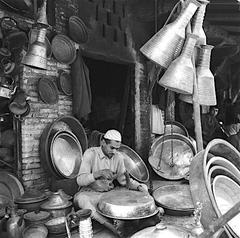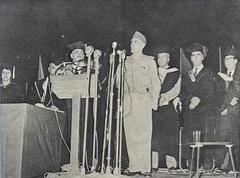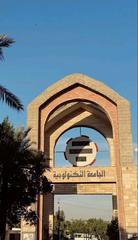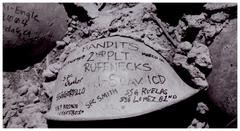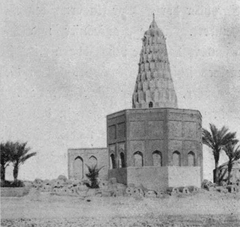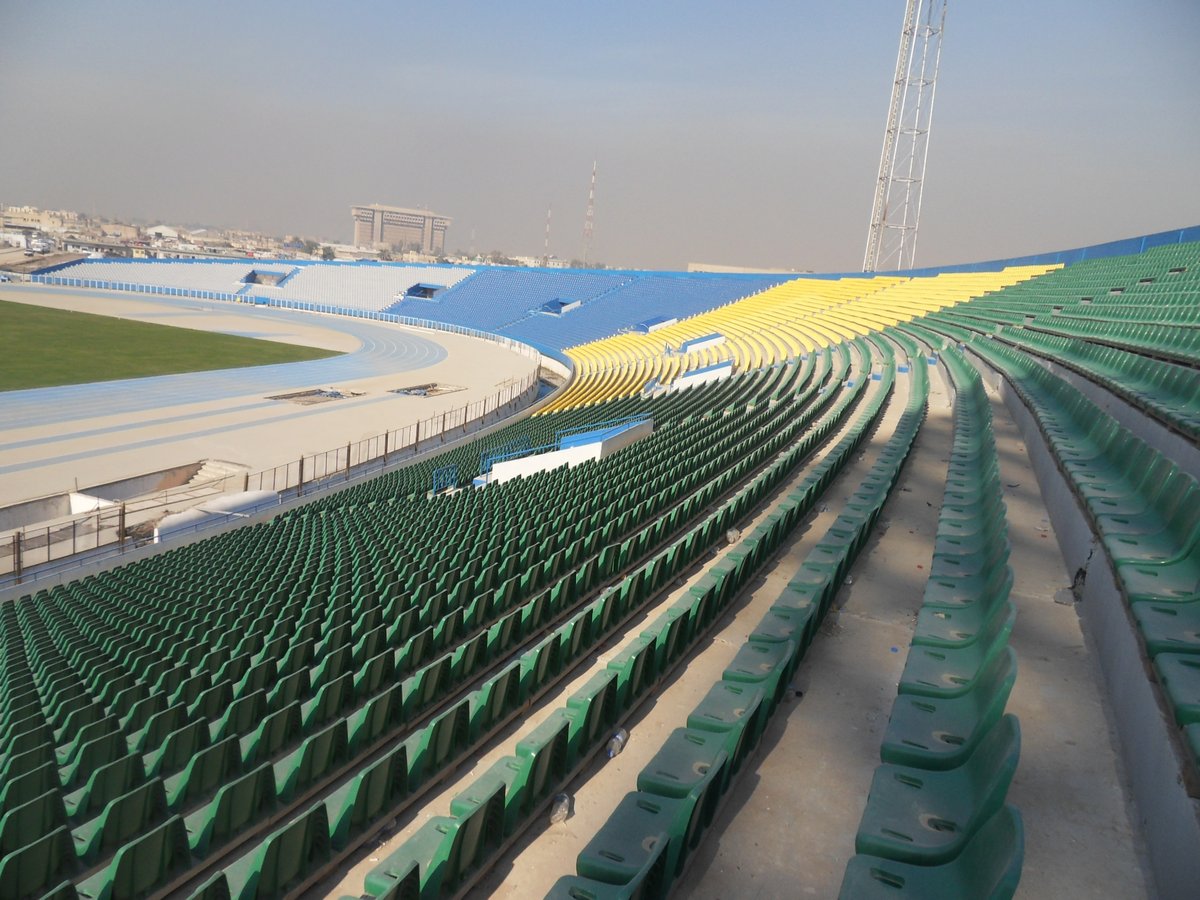
Complete Guide to Visiting Al-Shaab Stadium, Baghdad, Iraq: Visiting Hours, Tickets, and Nearby Attractions
Date: 14/06/2025
Introduction
Al-Shaab Stadium, centrally located in Baghdad, stands as a monumental testament to Iraq’s sporting heritage and cultural resilience. Since its inauguration in 1966, this iconic venue—often called “The People’s Stadium”—has been more than just a football ground; it has served as a beacon of national unity, a host for significant cultural and political events, and a symbol of hope for generations of Iraqis. This comprehensive guide offers travelers and sports enthusiasts essential insights into Al-Shaab Stadium’s history, architectural highlights, visiting hours, tickets, accessibility, and the best nearby attractions to make the most of your visit (StadiumDB; Al Jazeera; Iraqi News).
Table of Contents
- Introduction
- Origins and Construction
- Role in Iraqi Sports and National Identity
- Political and Social Significance
- Renovations and Modernization
- Architectural Features
- Visiting Al-Shaab Stadium (Hours, Tickets, Accessibility)
- Getting There and Nearby Attractions
- Memorable Matches and Events
- Cultural Legacy and Symbolism
- Recent Developments and Future Prospects
- Visitor Tips
- Frequently Asked Questions (FAQ)
- Conclusion
- References
Origins and Construction
Al-Shaab Stadium was conceived during Iraq’s modernization drive in the late 1950s. Construction began in 1957, aiming to create a national arena symbolic of Iraq’s aspirations. Officially opened on November 6, 1966, the stadium was Iraq’s largest, accommodating up to 45,000 spectators. Its name, “Al-Shaab” (“The People”), reflects its foundational vision as a unifying public space (StadiumDB; Iraqi News).
Role in Iraqi Sports and National Identity
From its first day, Al-Shaab Stadium became the epicenter of Iraqi football, hosting the Iraqi Premier League, Iraq FA Cup finals, and the national team’s home matches. It was the venue for the 1979 Gulf Cup of Nations, a defining moment when Iraq secured the championship on home soil (RSSSF). Al-Shaab has also welcomed athletics events and served as a communal hub for national celebrations and moments of mourning.
Political and Social Significance
Throughout its history, Al-Shaab Stadium has mirrored Iraq’s political climate. During the Ba’athist era, it was used for state rallies and military parades. The 2003 war and subsequent instability led to periods of neglect and alternative uses, such as shelter for displaced people. Despite these challenges, the stadium remains a strong symbol of Iraqi perseverance (Al Jazeera).
Renovations and Modernization
Recognizing its importance, authorities have repeatedly upgraded Al-Shaab Stadium. Major renovations since 2010 brought improved seating, upgraded floodlights, modern locker rooms, enhanced safety, and a new scoreboard. The latest changes reduced the capacity to around 34,200 with the installation of individual seats but greatly improved spectator comfort and safety (StadiumDB).
Architectural Features
The stadium’s oval bowl design, with tiered seating and a cantilevered main stand roof, gives fans unobstructed views. It features a natural grass pitch, training fields, and modern facilities for athletes. The four 55-meter floodlight towers ensure the stadium shines bright during night events. VIP seating, press areas, and accessibility ramps are available, but some facilities may lag behind the newest international standards (Football Tripper; Wikiwand).
Visiting Al-Shaab Stadium: Hours, Tickets, and Accessibility
Visiting Hours
- Open daily from 9:00 AM to 6:00 PM, subject to change on match or event days.
- For tours and non-event visits, confirm in advance with the stadium or via official channels.
Ticket Information
- Domestic matches: 2,000–10,000 Iraqi Dinars ($1.50–$7 USD).
- International fixtures: Higher prices.
- Tickets available at stadium box offices, authorized vendors, or online through the Iraqi Football Association.
Accessibility
- Ramps, elevators, and reserved seating for visitors with disabilities.
- Facilities are being upgraded but may not meet all international standards.
- Inquire ahead for assistance (MOYS Contact).
Guided Tours
- Offered by appointment through local agencies or the stadium’s administrative office.
- Tours may include VIP boxes, locker rooms, and the pitch area.
Getting There and Nearby Attractions
Al-Shaab Stadium is centrally located near Palestine Street and the Mohammed Al-Qasim Expressway, making it accessible by taxi, public transport, or private vehicle (Google Maps). Parking is available, but public transport is encouraged on busy event days.
Nearby attractions include:
- National Museum of Iraq: Rich archaeological and cultural displays.
- Al-Mutanabbi Street: Historic book market and literary cafes.
- Al-Zawraa Park: Popular for families and relaxation (Al-Zawraa Park).
- Baghdad Gymnasium: Architectural landmark.
- Latin Cathedral of St. Joseph and Baghdad Museum of Modern Art: Cultural highlights.
Memorable Matches and Events
Al-Shaab Stadium’s history is studded with iconic moments, including Iraq’s 1986 FIFA World Cup qualification and major international friendlies. The stadium remains pivotal for reintegrating Iraq into global sports, recently hosting FIFA-sanctioned matches (FIFA; BBC Sport).
Cultural Legacy and Symbolism
Al-Shaab Stadium is a symbol of national unity, referenced in literature, music, and political discourse. It stands for hope, resilience, and the collective Iraqi spirit, bringing together people of diverse backgrounds to share moments of triumph and sorrow (Al Jazeera).
Recent Developments and Future Prospects
Continuous upgrades keep Al-Shaab functional and safe, with plans for enhanced security, technology, and spectator services. While newer stadiums have emerged, Al-Shaab remains the spiritual home of Iraqi football and a preferred venue for major fixtures (Iraqi News).
Visitor Tips
- Arrive Early: Gates open 1–2 hours before events; arrive early for the best experience.
- Dress Modestly: Lightweight, modest attire with sun protection is advised.
- Cash Payments: Most vendors accept cash only.
- Respect Local Customs: Stand for the anthem, avoid prohibited items, and follow security instructions.
- Stay Informed: Check official sources for schedules and updates.
Frequently Asked Questions (FAQ)
Q: What are Al-Shaab Stadium’s visiting hours?
A: Typically 9:00 AM to 6:00 PM; hours may vary during events.
Q: How can I buy tickets?
A: At the stadium box office, through authorized vendors, or online via the Iraqi Football Association.
Q: Is the stadium accessible for people with disabilities?
A: Yes, but facilities are limited. Contact ahead for assistance.
Q: Are guided tours available?
A: Tours can be arranged by appointment; inquire through official channels.
Q: What attractions are nearby?
A: National Museum of Iraq, Al-Mutanabbi Street, Al-Zawraa Park, and more.
Conclusion
Al-Shaab Stadium is more than a sports venue—it’s a living monument to Baghdad’s collective history, resilience, and passion for football. Whether you’re attending a match, exploring its architecture, or visiting nearby cultural sites, Al-Shaab offers a unique window into Iraq’s vibrant society. For current event schedules, ticketing, and visitor guidance, consult official sources and the Iraqi Football Association. Enhance your experience by downloading the Audiala app for real-time updates and insider tips.
References
- StadiumDB: Al-Shaab Stadium
- Al Jazeera: Iraq’s Al-Shaab Stadium: A Symbol of Hope and Resilience
- Iraqi News: Al-Shaab Stadium Baghdad
- FIFA: Iraq 1986 World Cup Qualifying History
- RSSSF: Gulf Cup of Nations 1979
- The Tourist Checklist: Things to Do in Baghdad
- Trek Zone: Al-Shaab Stadium Baghdad
- Iraqi Football Association Official Website
- UK Government Iraq Travel Advice
- Baghdad Security Guidelines
- Weather Spark: Baghdad Climate
- Al-Zawraa Park, TripAdvisor
- Football Tripper: Al-Shaab Stadium
- Wikiwand: Al-Shaab Stadium
- Google Maps: Al-Shaab Stadium Location
- MOYS Contact
